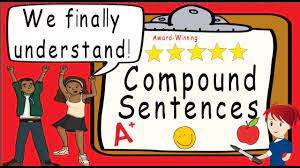

Theme Compound sentences
Tasks
1 Write out 5-15 active words and make your own sentences with them.
2 Make 5-15 questions using active words.
3 Make a plan for discussion.
4 Speak aboutCompound sentences
5 Do a test in Quizlet https://quizlet.com/508065630/test
You may do exercises with flashcards before writing a test.
https://quizlet.com/508065630/compound-sentences-flash-cards/
6 Revise grammar material at the themeCompound sentences and do a test.
Compound Sentences
We saw in sentence structure that a compound sentence is two (or more) independent clauses joined by a coordinating conjunction or semicolon. So a compound sentence is like two or more simple sentences added together. A compound sentence does not contain any dependent clauses.
Joining Compound Sentences with Coordinating Conjunctions
Usually, we join independent clauses with one of the seven coordinating conjunctions.
The term coordinating conjunction sounds complicated, but in fact there are only seven of them and they are all short, one-syllable words: For—And—Nor—But—Or—Yet—So — remember them with the mnemonic FANBOYS.
The most common of these coordinating conjunctions are and, but and or, in that order. Note that a comma (,) must come before the coordinating conjunction except when the clauses are short (in which case the comma is optional).
and
The and conjunction is the most common conjunction. It has several uses.
but
We use the but conjunction to introduce a clause that contrasts with the preceding clause, for example: Mary ran fast, but she couldn't catch John.
or
We use the or conjunction to join two alternative clauses, for example: Will Mary go, or will John go?
nor
We use the nor conjunction to join two alternative clauses when the first clause uses a negative such as neither or never. In this case both clauses are untrue or do not happen, for example: Mary never wrote the letter, nor did she call him. (Note the inversion of subject and auxiliary: did she.)
for
We use the for conjunction (meaning something like because) to join two clauses when the second clause is the reason for the first clause, for example: He felt cold, for it was snowing.
yet
The yet conjunction is similar to but. It means something like but at the same time; but nevertheless; but in spite of this. As with but, there is a contrast between the clauses, for example: I have known him for a long time, yet I have never understood him.
so
The so conjunction means something like therefore; and for this reason. We use so to join two clauses when the first clause is the reason for the second clause, for example: He was feeling sick, so he went to the doctor.
Note that when using a coordinating conjunction, you can (if you wish) remove any subject word and modal auxiliary from the second clause. (This is not possible with subordinating conjunctions.)
Joining Compound Sentences with Semicolons
Occasionally, we join independent clauses with a semicolon (;).
Joining Compound Sentences with Conjunctive Adverbs
We can also join independent clause with words and phrases like moreover, however, at least (conjunctive adverbs). In this case, the conjunctive adverb must be preceded by a semicolon (;) and followed by a comma (,).
Look at these examples:
How to join independent clauses
comma + coordinating conjunction
Independent clause
, for , and , nor , but , or , yet , so
independent clause.
semicolon
;
semicolon + conjunctive adverb + comma
; moreover, ; however, ; indeed, ; therefore, ; at least,
The table shows all seven coordinating conjunctions, and a few conjunctive adverbs as examples.
Do not try to join independent clauses with a comma alone—that's impossible!
Compound Sentence Examples
Now look at some more examples showing compound sentences and coordinating conjunctions or semicolons in context.
Compound Sentences with Coordinating Conjunctions
Compound Sentences with Semicolons
Compound Sentences with Conjunctive Adverbs
Compound Sentences in Famous Quotations
Here are some examples of compound sentences in quotes from famous people and sources.
Compound Sentences in Sayings
These compound sentence examples come from everyday sayings and proverbs in the English language.
A TEST
Complete the following sentences by filling in with appropriate choice given. Also, verify your answer with the answers provided at the end of the exercise.
1) I was ready to go, _________ the train got delayed.
2) He is leaving early, _________ he is feeling sick.
3) They are going on tour, __________ they aren’t happy.
4) Julie is working hard, _______ her grades are improving.
5) I didn’t want to be late, _________ I started before time.
6) I want a large burger,_________ without cheese.
7) You are calling me, _________ I will go alone.
8) John is not attending the classes, _________ he turns up for the exams.
9) Neil is a little nervous, __________ he will perform well.
10) He boarded a fast train, _________ he was late for the meeting.
11) I took the bag out, _________ there was no money in it.
12) The lecture may be long, ________ we may feel bored.
13) You have to move fast, ________ you might miss the last bus.
14) They are not going to college, _________ they want to go.
15) I like to play chess, _______ I have no time.
16) We didn’t understand the concept, ________ we understood the design.
17) He was angry, ________ he was cheated.
18) He is older, ________ he is healthy.
19) He ate fast, ________ he was in a hurry.
20) Julie will not cook the meal, ________ she is interested in cooking.
Оставьте свой комментарий
Авторизуйтесь, чтобы задавать вопросы.